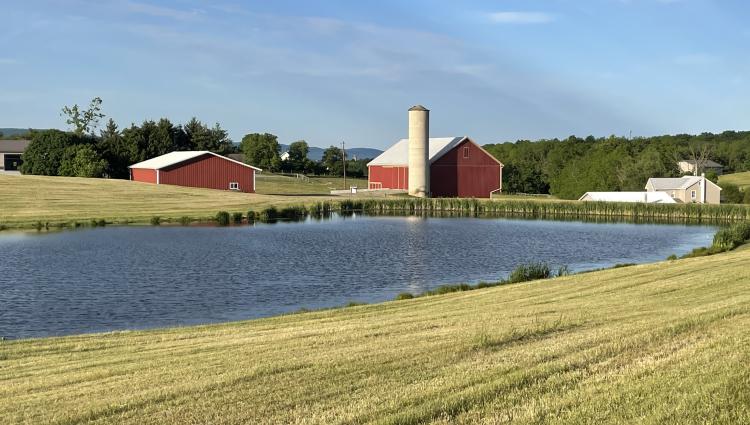Newsroom
QuickBooks Farm Accounting Training

Request your free replay of the QuickBooks Farm Accounting Training webinar series where one of our Ag Business Consultants teaches you how to use QuickBooks Desktop to optimize your financial management and become more efficient with your overall business management practices.
Please enter a valid password to access this page:
Wrong password. Try again!Request Your Replay Here!
Please fill out all form fields to request your replay of the QuickBooks Farm Accounting Training webinar series. You will receive an email with all of your resources within the hour. If you have not received your resources email, please check your spam or junk folder before contacting learning@horizonfc.com.
Newsroom
Farm Accounting: Essential Tips

Request your free replay of the Farm Accounting: Essential Tips webinar where experts discuss step-by-step tips for keeping good farm records and selecting a farm accountant. This recording will teach you:
- Tips and best practices for good farm recordkeeping
- How to select a qualified farm accountant
- Where to find a farm accountant
Please enter a valid password to access this page:
Wrong password. Try again!Request Your Replay Here!
Please fill out all form fields to request your replay of the Farm Accounting: Essential Tips webinar. You will receive an email with all of your resources within the hour. If you have not received your resources email, please check your spam or junk folder before contacting learning@horizonfc.com.
Being a member of our cooperative provides many unique benefits - one of them being the ability to have you voice heard in our annual Board election process. This is a critical function to our Association and enables us to ensure we provide our members with the best possible experience.
As we look ahead to our 2025 election, we wanted to share a few updates with you and what you can expect to see on your ballot this fall.
Knowledge is power and at Farm Credit, we’re committed to providing resources and education to help you grow.
Taking the first step is the most important part in setting you up for your future success. Our grant and award programs are designed to support you wherever you may be in your journey to begin farming or inspire your community.
Are you looking to make a lasting impact on agriculture and your local community? Farm Credit's Community Investment Grant is here to help. With funding of up to $10,000, we support nonprofit organizations that align with our mission and support innovation, education, and community building.
Newsroom
Country Living Guide: Six Things You Need to Know Before Buying Land

From the mountains of Western Maryland, to the rolling farmland of Pennsylvania and the quaint coastal towns on Delmarva, the mid-Atlantic region has something for everyone. With some careful planning and research, you can make the move to somewhere with a little more elbow room, confident and ready for your next adventure. To help get you started, here are a few things to consider before you make the jump into country living.
1. How will you use the property?
This may seem like a loaded question, but it’s an important one. Knowing how you want to use your land will help you narrow down the property features to look for as you begin your search. Think about it like this: if you’re passionate about hunting, your main priority may be to find wooded acreage, as opposed to someone interested in raising horses, who may prefer level, cleared, and/or fenced in pastures. If you want to buy land to build a future home, you might look for other important features like proximity to utilities and roads. Specifying your intended land use will also help guide decisions on determining how much acreage you want, the locations you want to look into, and can help your Realtor prepare you with pertinent zoning regulations. Certain animals and activities require minimum amounts of land and/or specific zoning or permitting.
2. Where do you want to be located?
If you intend to use this property to build a future home in the country, you’ll set the stage for new opportunities, like developing a hobby or enjoying a less stressful environment. But if you’re looking for something more permanent than a summer or weekend country home, remember that your daily routine will need to move with you. This could mean becoming a more conscientious traveler as you plan errands to the grocery store or shopping trips. Most of these places may be a bit further away, so advanced planning may be required. In addition, if you commute to work each day, determine how far you are willing to travel, and limit your search to that area. Don’t forget about a few other factors, like proximity to schools (if you have children), airports, health care providers, and recreational resources (your gym or favorite coffee shop). For some, the farther off the beaten path a property is, the better. Others feel more secure with neighbors close by. If you’re used to hustle and bustle, make sure to visit the properties you’re interested in at different times to know exactly what you’re getting yourself into. The difference in the environment during the day and at night are, well, day and night. A beautiful green pasture under the hot summer sun might look a little less appealing after it floods following an inch or two of rain.
3. What is the surrounding area like?
If possible, spend some extended time in your chosen area before you commit to buying. This will give you the opportunity to get acquainted with the local residents and overall environment. Don’t forget to make conversation, too! You’ll be amazed at how many folks are willing to give their two cents when someone mentions moving to the area.
4. Can you commit to the country way of life?
Life in the country is very different from city or suburban living. You’ll be sharing land with plenty of folks, who just like you, have a dream for how they want to live on their own land. For example, you may find yourself behind a tractor in traffic. Or, you may smell manure occasionally, especially when a farmer is fertilizing. Be patient and prepared! Living on more acreage also comes with wild animals that also call your land their home, whether you invite them to stay or not. You’ll learn quickly how to keep foxes out of the henhouse (sometimes) or raccoons out of the trash cans, but be careful not to create problems for your neighbors as you interact with these animals. Feeding wild animals, like bears or feral cats, can create a serious safety hazard for you, your domesticated animals, and even your neighbors. In short, don’t do it.
5. Are you ready to have the zoning talk?
Local zoning regulations have become stricter over the years, which is why it’s imperative to familiarize yourself with them beforehand. If you have grand plans for your property, like building a home or making improvements to an existing one — or to ensure that construction of a mall or highway isn’t in the works contact your local zoning office and have a conversation:
- Delaware: Directed by Municipalities
- Kent County: Kent County Planning
- New Castle County: New Castle County Zoning
- Sussex County: Sussex County Planning and Zoning
- Maryland: Maryland Planning Locations
- Pennsylvania: Community Planning
- Virginia: Directed by County – Search for “Virginia Planning and Zoning”
- West Virginia: Directed by Municipalities – Search for “West Virginia Planning and Zoning”
We mentioned it before, but raising animals/livestock and other farming activities may be limited by zoning, which is why you want to do your research ahead of time. Being on the wrong side of these regulations later could mean fines or having to downsize — better to be safe than sorry!
6. Does your lender understand your vision?
You have goals for this property and a vision for how you’re going to get there. That’s something most banks don’t really understand. Buying land is different than taking out a mortgage for multiple reasons. When you buy rural land, the inherited risk of making a loan goes up due to a lack of properties for value comparison, buyers, or people that can even afford to buy. In addition, appraisal values on farmland and buildings are different than regular home appraisals. That’s the difference between Farm Credit and the other guys. We think more in acreage, and less in square footage. Our expertise amounts to over 100 years in providing financing to rural America and agriculture, so we know exactly how to get you where you want to go on your next adventure. If you’re ready to make your dream of living in the country a reality, reach out to a loan officer today. We won’t pack up your moving boxes (if needed, we do know a guy), but we promise to help you figure out how to make the move, one way or another.
Found the land with the perfect home?
Ask about our First Time Rural Property Owner Program
Affording your perfect country property can be a challenge today. If you've found the land with the perfect home we’ve developed a program specifically for first-time rural property owners – to help you cut costs that matter. Financing is available for up to 85% of your purchase price or appraised value with no mortgage insurance for first-time rural property owners*. What does that mean for you? Financing a greater amount of your purchase/appraised price can help you maintain liquidity for other improvements, should you wish to make them. No mortgage insurance means thousands of dollars in savings for you in the long run. Give us a call today to learn more about how Farm Credit can help you finance your perfect piece of country.
*Certain restrictions apply. This offer is subject to credit approval.
Please enter a valid password to access this page:
Wrong password. Try again!Newsroom
The Difference Between Agriculture Lines of Credit vs. Ag Loans

Farmers face unique financial challenges, such as fluctuating income, seasonal expenses, volatile costs, and significant investments in equipment and infrastructure. Access to appropriate financing options helps manage these challenges and supports sustainable farm operations. Two primary financing options available to farmers are agriculture lines of credit and agricultural loans. Both come with their own set of advantages and disadvantages, but what are the differences between these two financing options, and which is the best one for you?
Agriculture Lines of Credit
What is an Agriculture (Operating) Line of Credit?
An agriculture line of credit is a revolving credit option that allows farmers to borrow, repay, and re-borrow funds up to a specified limit. It offers flexibility for managing short-term expenses and working capital needs.
Key Features of Ag Lines of Credit
- Revolving Credit: Allows funds to be borrowed, repaid, and reused multiple times within the credit limit.
- Flexibility in Borrowing and Repayment: Borrowers can access funds as needed and repay them when it suits their cash flow.
- Short-Term Use: Typically used for short-term operational expenses like seed, feed, fertilizer, and more.
Advantages of Lines of Credit
- Financial Flexibility: Provides financial flexibility for seasonal or fluctuating expenses, allowing farmers to access funds when needed.
- Interest on Usage: Interest is charged only on the amount of credit used, not the entire credit limit, helping to manage borrowing costs.
- Cash Flow Management: Helps bridge gaps in income and manage cash flow during low-income periods.
Disadvantages of Lines of Credit
- Higher Interest Rates: May have higher interest rates compared to traditional loans, increasing the cost of borrowing.
- Periodic Renewal and Re-qualification: Requires periodic renewal and re-qualification, which can be time-consuming and stressful.
- Lower Borrowing Limits: Often have lower borrowing limits compared to agricultural loans, potentially restricting available funds.
Agriculture Loans
What is an Agriculture Loan?
An agriculture loan is a lump sum of money borrowed and repaid over a fixed term. These loans are generally used for long-term investments and significant purchases.
Key Features of Ag Loans
- Lump Sum Financing: Provides a single lump sum that is repaid over a specified period.
- Fixed or Variable Interest Rates: Loans can have either fixed or variable interest rates, offering predictable repayment schedules or potentially lower initial rates.
- Used for Long-Term Investments: Suitable for substantial investments like purchasing farms, land, equipment, or infrastructure improvements.
Advantages of Ag Loans
- Lower Interest Rates: Often have lower interest rates compared to lines of credit, reducing the overall cost of borrowing.
- Predictable Payments: Fixed repayment schedules provide predictable monthly costs, letting you plan your finances without any surprises
- Facilitates Large Investments: Allows for larger, long-term investments in farm operations and equipment, supporting growth and development.
Disadvantages of Ag Loans
- Less Flexibility: Fixed repayment schedules offer less flexibility compared to the revolving nature of lines of credit.
- Collateral Requirements: May require collateral or a down payment, increasing the initial financial burden.
- Prepayment Penalties: Some loans may impose penalties for early repayment, limiting financial flexibility.
Choosing Between Ag Lines of Credit and Loans
Factors To Consider
- Purpose of Financing: Determine whether the need is for short-term operational expenses or long-term investments.
- Amount Needed: Evaluate the borrowing limits of each option and how they align with your financial requirements.
- Interest Rates: Compare the interest rates offered by each option and their impact on overall costs.
- Flexibility and Cash Flow: Assess your need for flexible repayment terms and how each option affects your cash flow.
Discuss Your Options with an Agricultural Lender
Consult with an agricultural lender who can provide personalized advice and help you understand the best financing options for your farm's specific needs. They can assist in tailoring a financial strategy that incorporates both lines of credit and loans or help you choose the financial option best for you.
Consider Both Financing Options
You don’t have to restrict yourself to just one type of financing. In many cases, using both agricultural lines of credit and loans in combination can provide the best of both worlds. Lines of credit can cover short-term, flexible needs, while loans can support larger, long-term investments. This combined approach can enhance financial stability and support sustainable farm growth.
Ag Lines of Credit vs Ag Loans
Agriculture lines of credit offer flexibility for short-term needs with revolving credit, whereas agricultural loans provide a lump sum for long-term investments with fixed repayment schedules. Understanding these differences and working closely with an agricultural lender can help you select the best financing solution to ensure your farm's success.
Have questions about the perfect loan for your business? Contact us today to see how we can help you.
Please enter a valid password to access this page:
Wrong password. Try again!Newsroom
What to Look for In An Agricultural Lender

Choosing the right agricultural lender can significantly impact the success of your farming operations. Agricultural (Ag) lenders play a crucial role in providing the financial support necessary for purchasing equipment, expanding operations, and navigating the unique financial challenges of farming. This blog will guide you through the essential factors to consider when selecting an agricultural lender, ensuring you make an informed decision that supports your farm's goals and growth.
The Role of Agricultural Lenders in Farm Success
Agricultural lenders are more than just financial institutions; they are partners in your farming business. They provide the capital needed to invest in new technologies, land, and infrastructure, which can improve productivity and profitability. A good agricultural lender understands the cyclical nature of farming, including the seasonality and specific financial challenges that come with it. They serve as a confidant and someone you can bounce ideas off of. By choosing the right lender, you can secure the necessary loans and products that align with your farm's cash flow and growth plans.
How to Vet Your Ag Lender
When evaluating potential agricultural lenders, it's essential to thoroughly vet them to ensure they can meet your farm's needs. Here are some key aspects to consider:
Industry Experience and Knowledge
One of the most critical factors in selecting an agricultural lender is their experience and understanding of the agricultural industry. An ag lender with extensive industry knowledge will:
- Understand agricultural cycles and seasonality, providing financing options that align with these patterns.
- Be familiar with the specific needs and challenges of your farm type, whether you run a dairy farm, grow crops, or manage a vineyard.
- Offer valuable agricultural industry insights and advice that can help you make informed business decisions.
Flexibility and Customization
Every farm is unique, and your financing solutions should reflect that. Look for an ag lender who is willing to:
- Tailor financing solutions to meet your farm's specific requirements.
- Offer a variety of loan types and repayment options to suit your financial situation.
- Discuss and adjust terms as needed to ensure the loan remains manageable throughout its duration.
Competitive Rates and Fees
The cost of borrowing is a crucial consideration. Finding the best interest rate and fees means you’ll not only be getting a loan that will have a positive impact on your finances, but one that you’ll be able to pay back. Ensure your ag lender offers:
- Competitive interest rates on loans to keep your financing costs low.
- Transparency in fees and charges so you know exactly what you're paying for.
- Good value for the cost of borrowing, ensuring you receive the support and services you need at a fair price.
- A key question to ask your lender is whether or not there are prepayment penalties.
Strong Financial Stability and Reputation
Choosing an ag lender with a solid financial foundation and a positive reputation in the agricultural community is vital for long-term success. Look for:
- A proven track record of financial strength and stability, indicating the lender's ability to support you in the long term.
- Positive testimonials and references from other farm owners who have successfully worked with the lender.
- A good reputation within the agricultural community, which can be a reliable indicator of the lender's reliability and trustworthiness.
Responsive Customer Service
Good customer service can make a significant difference in your lending experience and help resolve any problems you might encounter. Ensure your ag lender provides:
- Easy access and responsiveness to inquiries, ensuring you get the answers you need promptly.
- A dedicated point of contact for your account, so you always know who to turn to for assistance.
- Prompt turnaround times for loan applications and decisions, helping you secure funding when you need it most.
Additional Resources and Support
Beyond financial support, a great ag lender offers additional resources that can help you manage your farm more effectively. These may include:
- Educational resources and workshops on farm financial management, helping you improve your business knowledge.
- Referrals to other agricultural professionals, such as accountants and insurance agents, to provide comprehensive support.
- Assistance with government programs and grants, ensuring you take advantage of all available financial opportunities.
Long-Term Partnership Potential
Finally, consider the potential for a long-term partnership with your ag lender. A lender committed to building a long-term relationship will:
- Show a willingness to grow with your farm over time, providing support as your needs evolve. A track record of building long lasting relationships with clients is a good indication of long-term partnership potential.
- Offer opportunities for future collaboration and support, ensuring you have a reliable financial partner as your farm expands.
- Demonstrate a commitment to your success beyond just the bare minimum, helping you navigate challenges and seize opportunities.
Choosing The Right Agricultural Lender
Choosing the right ag lender is not just about securing a loan, it's about finding a partner who will support your farm's journey. Take the time to vet potential lenders, consider their industry experience, flexibility, rates, reputation, customer service, additional resources, and long-term partnership potential.
Have questions? Contact us today to see how we can help you.
Please enter a valid password to access this page:
Wrong password. Try again!At Farm Credit, we offer financing options for both agricultural and home construction projects. Whether you're expanding your farming operation or building your dream home, our loans provide flexible terms, cost-saving incentives, and personalized support to make your vision a reality. Click here to learn more about our Agriculture Construction Loans and here for Home Construction Loans.